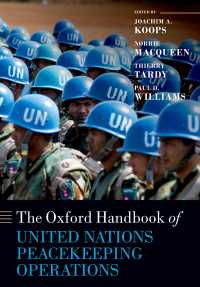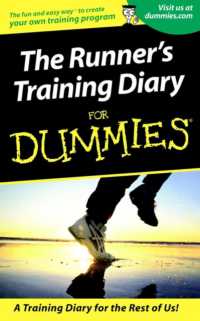Full Description
Over a century after racial zoning was invalidated, American land use remains racially unjust. When racist tools were abolished, other facially neutral tools were created or adapted to maintain white power and wealth. Policies, practices, and laws evolved to embed racial inequality and white supremacy deeply into institutional structures and landscapes. Despite modest improvements since the early twentieth century, land use and neighborhood conditions for Black people and other people of color remain dramatically worse than for whites. Discrimination and segregation persist. This enduring and multi-faceted nature of racial injustice in the American land use system means that there is no one cause and no one solution. Instead, this book advocates for nuanced systemic change. Using cross-disciplinary analysis in social-movement history, legal theory, and public policy, the authors call for a racial-justice transformation that integrates grassroots racial-justice activism, newly revitalized anti-subordination legal theories, and many different public policy reforms.
Contents
1. The intransigence of racial injustice in American land use 100+ years after Buchanan v. Warley Craig Anthony (Tony) Arnold, Cedric Merlin Powell and Catherine Fosl; 2. The paradox of Buchanan v Warley: the early twentieth-century black freedom movement and the battle against residential apartheid Catherine Fosl; 3. Structural inequality and the evolving movements for land use justice: from housing injustice to environmental injustice to resilience injustice Craig Anthony (Tony) Arnold, Elizabeth Roseman, Payton Klatt, Leanna Banda Cruz, Ra'Desha Williams and Andrew Schuhmann; 4. Assemblages of inequalities and resilience ideologies in urban planning Emmanuel Frimpong Boamah and Craig Anthony (Tony) Arnold; 5. Race displaced: Buchanan v. Warley and the neutral rhetoric of due process Cedric Merlin Powell; 6. There's something happening here: affordable housing as a nonstarter in the US supreme court Michael Allan Wolf; 7. What would Louis do? the 'brandeis brief' on land use and its present impact on racial segregation Laura Rothstein; 8. Why segregation matters: the inequality of opportunity Michael C. Lens; 9. Zoning's racial innocence and the imperatives of segregation Audrey G. McFarlane; 10. Understanding evictions as racialized land use practices in Louisville, Kentucky Kelly L. Kinahan and Lauren C. Heberle; 11. Hope and transformation: the next 100 years of racial justice in American land use Craig Anthony (Tony) Arnold, Cedric Merlin Powell, Laura Rothstein and Catherine Fosl; Index.








